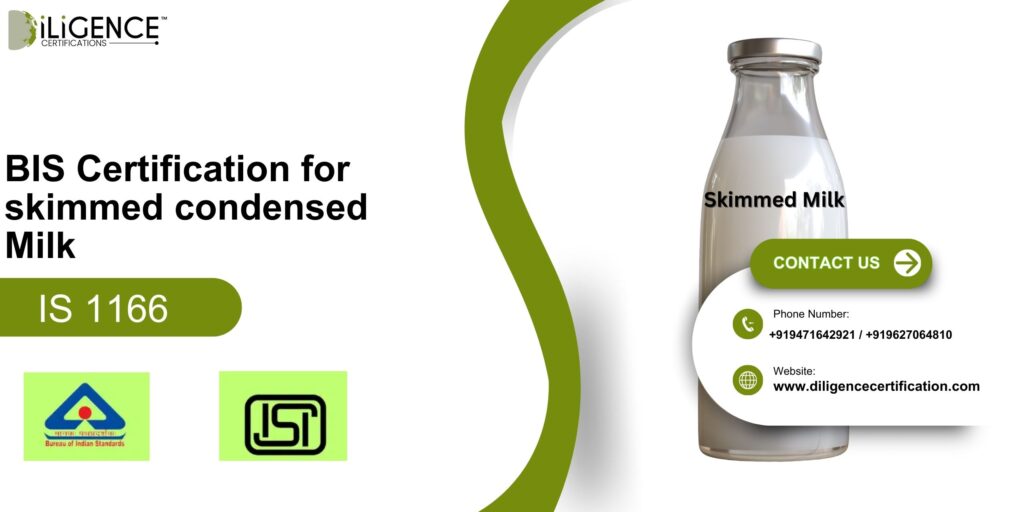- Ensures safety and quality assurance for BIS Certification for skimmed condensed milk under IS 1166.
- The process also includes auditing the factory for compliance with hygiene, equipment, and storage.
- It grants the right to market products with an ISI mark, according to IS 1166.
- It increases consumer confidence and adds credibility to the brand in India.
- It allows for broader distribution and keeps you compliant to sell to the national market.
Introduction
When a mid-sized dairy brand in Gujarat sought our help last year, they wanted to expand their skimmed condensed milk products to the whole country. However, their distributors told them, without proper BIS certification under IS 1166, their skimmed condensed milk products would be in trouble, and consumers would be reluctant to purchase it being unsafe.
This is likely not a unique situation. Skimmed condensed milk flavor composition all over India—from chai stalls in Delhi to upscale dessert makers in Mumbai–and you should be compliant to the regulation. Having BIS Certification under the IS 1166 process, is not just busy work, it’s a strategy for safety for the brand and consumer confianza.

What is BIS Certification for Skimmed Condensed Milk under IS 1166?
The Bureau of Indian Standards, or BIS, is a statutory body that is responsible for standardisation and quality certification of products in India.
IS 1166 is the standard that defines the requirements for skimmed condensed milk relating to composition, microbiological limits, and labelling. BIS certification provides assurance that the product:
- Is in compliance with the legal requirements.
- Meets high standards of quality and hygiene.
- Is safe for consumption, across India.
Who Needs BIS Certification For Skimmed Condensed Milk?
Manufacturers
Any type of manufacturer or company producing skimmed condensed milk must obtain certification and their product must meet the required BIS standard to ensure quality, safety, and hygiene in accordance with Indian Standards to circulate products in the marketplace.
Importers
Any company importing skimmed condensed milk into India must obtain BIS certification before their product may be sold or distributed in the Indian marketplace.
Processors, Packagers & Repackagers
Any person or entity that processes, packages, or repackages skimmed condensed milk for direct or indirect selling must also be compliant with the standards set forth by the BIS.
Distributors and Retailers (Indirectly)
Distributors and/or Retailers may not have to have actual certification, but they may not sell any product unless that product is certified by the BIS.
Step-by-Step Process for skimmed condensed milk
Achieving BIS certification may seem daunting, but understanding each step simplifies the journey.
1. Testing of your Product in NABL accredited laboratories
All samples of skimmed condensed milk are to be tested for:
- Fat content and total solids
- Microbiological quality
- Adulterants and contaminants
Only NABL accredited labs will provide a report format that is accepted by BIS.
2. Inspection of the factory
BIS conducts a thorough audit of manufacturing facilities. Auditors evaluate:
- Sanitation procedures
- Storage and handling of the raw milk
- Equipment cleanliness and maintenance
Factories maintaining ISO 22000 or FSSAI certifications often have smoother BIS audits.
3. Submission of documentation
The brand must submit the following:
- Application form (Form 1)
- Test reports and process flow charts
- Specifications of raw materials
Proper documentation reduces the chances of query and re-submission.
4. Grant of License
Once testing and audit are approved, the Bureau will issue the ISI license. The ISI license allows the manufacturer to use the ISI mark on the product, which indicates that it meets IS 1166.
Timelines, Costs, Validity & Renewal:
- Timelines: 4–8 weeks (testing, inspection, document verification)
- Costs: application fee + testing charges + annual license fee
- Validity: 1 year from the date of issue
- Renewal: Apply before expiry with updated test reports, audit reports, and renewal fees
Importance of BIS Certification for Milk Powder
Regulatory Compliance
BIS certification is mandatory for many dairy products in India – including milk powder, The FSSAI is the “Food Safety and Standards Authority of India,” not “Academy”
A reassurance to manufacturers that they will avoid legal issues and penalties.
Builds Consumer Confidence
A BIS certified milk powder signifies quality and authenticity. It also works as a reassurance for consumers.
Promotes repeat sales and loyalty from consumers.
Competitive Marketing Advantages
BIS certifies your product as different from truly non certified competitors.
In a purchasing decision to trust, this can provide a basis for entry in Industry and quality requirements for domestic and international markets.
Establish Best Practices
Most certification requires that there are strict conditions of compliance with aspects, production, process, and packaging procedures.
Meaning hygiene, quality control and supply chain efficiencies.
Benefits of BIS Certification for Skimmed Condensed Milk
Increases Consumer Confidence
Consumers often associate the ISI mark with safety and authenticity. For instance, premium brands like Amul and Mother Dairy prominently display ISI certification, reassuring buyers of quality compliance.
Regulatory Compliance
BIS certification is a statement of compliance over the MVC and other Indian food regulations, thereby reducing the possibility of legal action or a product recall.
Expansion of Markets
Retail chains and institutional buyers will not stock some products unless the product has BIS certification. Because of this, BIS certification under IS 1166 may be the gateway to opening up some national distribution.
Competitive Advantage
Being ISI certified provides a competitive advantage over natural competitors in the dairy space, particularly because there is a higher level of credibility associated with certified products as this is a strict regulatory requirement over non-certified products.
Key Highlights of BIS Certification for Skimmed Condensed Milk
- Regulation compliance: Assurance that the product meets safety and quality standards in India as it relates to IS 1166.
- Consumer Assurance: As a legitimate certification the BIS certification and ISI Mark adds validity and consumer assurance that the product has been tested for safety.
- Quality Assurance: Confidence that a consistent fat percentage, total solids, microbiological quality and hygienic assurance.
- Market Access: The certification allows for your product to be sold throughout India, to consumers who are purchasing in retail chain stores and for institutional buyers.
- Audit and Documentation: Pre-implementation will consist of product testing, factory inspection visit, and necessary documentation required for traceability of the product.
- Competitive Advantage: Certification provides you credibility over products which are not business certified and add further validity for your recognized quality product.
- Digital Traceability (Optional): Having documentation in an ERP system or other digital format supports compliance with the standards from the inspection resulting in less audit questions.
Documents Required for BIS certification
Application Form
- Duly filled BIS application form (Form A for manufacturer’s license or appropriate form for product certification).
Company Details
- Certificate of Incorporation / Partnership Deed / Proprietorship details
- GST registration certificate
- PAN card of the company or proprietor
Factory/Production Details
- List of machinery and equipment
- Layout of the manufacturing unit
- Details of production capacity
Product Details
- Product name, specification, and scope of certification
- Ingredients/raw materials details
- Product testing reports from a recognized laboratory (if required)
Quality Management System
- ISO certification (if applicable)
- Standard operating procedures (SOPs) for production and quality control
Technical Personnel Details
- List of technical staff and their qualifications
- Competency details of quality control personnel
Other Supporting Documents
- Test reports from BIS-recognized labs
- Packaging and labeling samples
- Any previous certification or approvals (if applicable)
Why Choose Diligence Certification
Credibility & Recognition – Confirms your skills and is valued in most, if not all, industries.
Career Opportunities – Agnew competence, facilitating promotions, moving into specialized areas, and opening up new career opportunities.
Skill Validation – it formalizes the skills you bring to the workplace in a structured manner.
Leveraging your Skills for Performance Discrimination– Every job market is competitive. Being certified clarifies you above other candidates with both demonstrated level of skill and you pulling it over to the workplace.
Creating Trust and Assurance –Diligence Certification provides confidence to employers, clients, and stakeholders of the quality of your work.
Conclusion:
BIS certification for skimmed condensed milk under IS 1166 is a regulatory process, however, ISI is (or is becoming) a business asset to the manufacturer, that supports economy and/or scaling nationally, adds distribution channels, and provides a public assurance to the consumer that a manufactured skimmed condensed milk product is safe to consume. It should be considered by the manufacturer targeting economies of scale, consumers, and trajectories of growth, facility upgrades, and documentation today ensures smoother market entry tomorrow.
Frequently Asked Questions
What is BIS certification for skimmed condensed milk under IS 1166?
It is a rule for the Bureau of Indian Standards to obligate certification for skimmed condensed milk to comply with safety, quality and hygiene criteria as per IS 1166.
Why is BIS certification for skimmed condensed milk mandatory?
Certification provides safeguards for a regularly available food product, and ensures compliance with Indian food regulation by the manufacturers.
Who require a BIS certification for skimmed condensed milk?
Anyone manufacturing, importing, packaging, or processing skimmed condensed milk must acquire a BIS certification first before marketing in the Indian market.
What are the requirements of IS 1166 related to skimmed condensed milk?
IS 1166 is a standard for safety, referring to a definition on composition, microbiological limits, fat content, solid, labelling, and sanitation.
Which documents need to be submitted for BIS certification of skimmed condensed milk food products?
Documents will include a company registration, GST information (if applicable), a factory layout, product test report(s) and quality management information.
What is the duration of BIS certification under IS 1166?
Licenses are valid for 1 year and need annual renewal accompanied by test reports and audits.
Can I sell or distribute skimmed condensed milk imports without BIS certification?
No, in fact, importers will need to become certified by BIS prior to selling or distributing skimmed condensed milk in India.
What are the advantages of BIS certification for skimmed condensed milk?
The benefits will include compliance with regulations, trust from consumers, potential market access opportunities for growth and presumably a competitive edge.
What can happen if I sell skimmed condensed milk without BIS certification?
Possible legal repercussions, potential fines, possible recalls of products, an adverse impact to brand reputation, etc.
How long does the BIS certification process take?
Typically, it takes 4–8 weeks, depending on product testing, factory inspections, and document verification.
Highlight








 BIS Certification
BIS Certification
 CDSCO
CDSCO
 CPCB
CPCB
 LMPC
LMPC
 WPC Approval
WPC Approval
 Global Approvals
Global Approvals
 TEC
TEC
 ARAI
ARAI
 BEE
BEE
 ISO Certification
ISO Certification
 DGCA Certification
DGCA Certification
 NOC For Steel
NOC For Steel



















 Business Registration
Business Registration















 Legal Services
Legal Services
 Trademark Registration
Trademark Registration
 Copyright Registration
Copyright Registration
 Patent Registration
Patent Registration















































